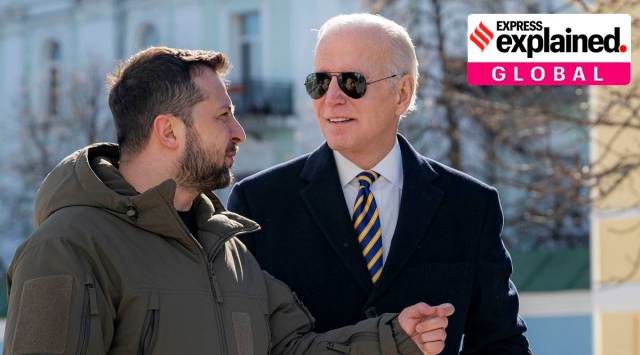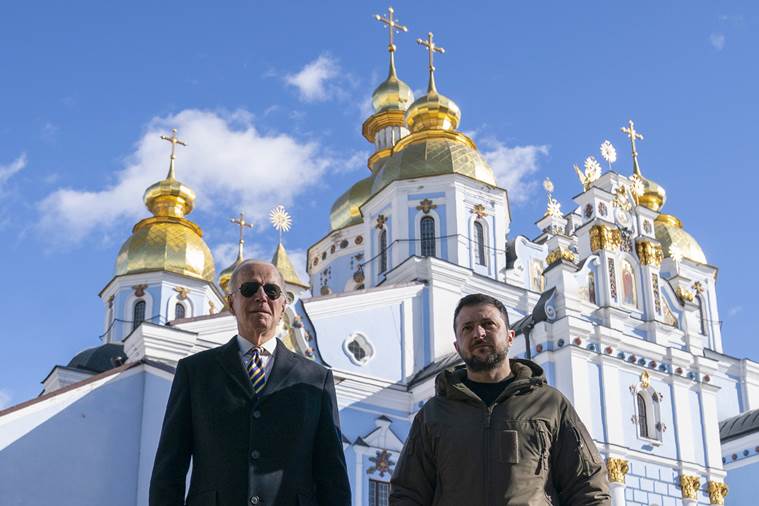Hard signals from Biden, Putin: Why end to Ukraine war is nowhere in sight
US President Joe Biden visited Ukraine, and later announced the US 'would not tire' against 'tyrants'. President Vladimir Putin declared Russia would not lose, and suspended participation in the New START treaty. An end to the war is nowhere in sight.
 President Joe Biden, right, and Ukrainian President Volodymyr Zelenskyy talk during an unannounced visit in Kyiv, Ukraine, Monday, Feb. 20, 2023. (Ukrainian Presidential Press Office via AP)
President Joe Biden, right, and Ukrainian President Volodymyr Zelenskyy talk during an unannounced visit in Kyiv, Ukraine, Monday, Feb. 20, 2023. (Ukrainian Presidential Press Office via AP) First US President Joe Biden’s visit to Kyiv on Monday with a promise to stand by Ukraine “as long as it takes”, and then Russian President Vladimir Putin’s address to the nation on Tuesday, in which he said Russia was fighting for its very existence and announced a temporary withdrawal from an agreement between the two powers for capping their strategic nuclear weapons, are strong indications that the war is set to continue until one or the other side manages to inflict defeat on the other and declare “victory”.
Biden’s secretly undertaken visit to the Ukrainian capital three days ahead of the first anniversary of Russia’s invasion of its neighbour, and his promise to supply more weapons, came with an assurance to President Vlodymyr Zelensky: “It is worth fighting for as long as it takes, and that’s how long we are going to be with you, Mr President. As long as it takes.”’
Biden’s presence in Kyiv was a finger in the eye of Putin, who imagined a year ago that his invasion would be a swift, short, surgical operation, ending with the surrender of Ukraine. Instead, as Biden said, “One year later, Kyiv stands”, while Russia has found itself bogged down in a long war of attrition, in which Ukraine has managed to reverse some of its territorial losses, while being subjected to waves of Russian aerial bombardment on its cities. Millions of Ukrainians have been displaced, countless soldiers have perished on both sides, and the civilian casualties in Ukraine are believed to far exceed the official count of 19,000 (according to UN agencies).
By showing up in the war theatre, Biden also appeared to pit himself one on one against Putin, erasing the transatlantic distance between them, and appearing to confirm to the Russian leader his repeated claim — one that he reiterated today — that this is a proxy battle by the US-led West against Russia, in which both Ukrainians and Russians are victims.
The Russian President’s speech, which was pre-scheduled, appeared to address Biden’s promise of a military aid package that would include artillery ammunition, anti-armour systems and air surveillance radars “to help protect the Ukrainian people from aerial bombardments”. The US president made no mention, however, of the F16s that Zelensky wants to help Ukrainian forces push back the Russian army, though Biden has said earlier that he was considering the request.
“Putin’s two main points were that any use of long-range weapons against Russia would mean that Russia would have to move deeper into Ukrainian territory to protect its territories; and two, temporary withdrawal from the START agreement will give Russia the freedom to manoeuvre in case of Western escalation of support to Ukraine, including if NATO got directly involved in the conflict,” said Nandan Unnikrishnan, Russia specialist who heads the Eurasia programme at the Observer Research Foundation.
 Russian President Vladimir Putin delivers his annual address to the Federal Assembly in Moscow, Russia February 21, 2023. (Sputnik/Dmitry Astakhov/Kremlin via Reuters)
Russian President Vladimir Putin delivers his annual address to the Federal Assembly in Moscow, Russia February 21, 2023. (Sputnik/Dmitry Astakhov/Kremlin via Reuters)
Unnikrishnan said that Putin spoke of US planning to carry out tests of nuclear weapons as the use-by date of some was nearing, and if that happened, Russia would also conduct its own tests.
“Putin’s message is clearly that a war against Russia cannot be won,” Unnikrishnan said, while underlining that the Russian president also said that “no one should be under the illusion that strategic parity could be destroyed”.
The US and Russia signed the Strategic Arms Reduction Treaty (START) in 2011. According to the US State Department, both sides met the central limits of the Treaty by February 5, 2018, and have stayed at or below them ever since. A five-year extension to the treaty, beyond its original expiry date of 2021, will end in 2026.
 President Joe Biden walks with Ukrainian President Volodymyr Zelenskyy at St. Michael’s Golden-Domed Cathedral on a surprise visit, Monday, Feb. 20, 2023, in Kyiv. (AP Photo/Evan Vucci)
President Joe Biden walks with Ukrainian President Volodymyr Zelenskyy at St. Michael’s Golden-Domed Cathedral on a surprise visit, Monday, Feb. 20, 2023, in Kyiv. (AP Photo/Evan Vucci)
This January, the US said Russia was in violation of the treaty as it had refused permission for inspections on its territory. Putin said on Tuesday that the West wanted to inflict what it calls “strategic defeat” on Russia, and he would not allow inspectors on Russian soil as they would share locations of its strategic arsenal with the Ukrainians.
Putin’s withdrawal, even if temporary, has evoked fears of a return to the Cold War days before the first agreements on arms control — SALT I and II — were signed in the 1970s.
There is no certainty anymore that Russia and the US can sit down and negotiate a new arms treaty, or even if they do, if it can cover the West’s perceived nuclear threat from a Russia-China axis, or Russia’s concerns over a threat from the two nuclear powers closer home — France and the United Kingdom.
In a more general sense what Putin’s decision has signalled is the complete breakdown of trust between the two sides.
The last time that Russia and the US had a decent conversation — both sides described it as “constructive” — was at Geneva in June 2021. Expectations that the dialogue from the summit would continue, as agreed in the joint statement, were belied.
Over the last year of a deepening war, with the US and the Western alliance funnelling arms into Ukraine, and Russia positioning itself as fighting an existential war against the West and threatening now and then to use its tactical nukes, the distance between the two sides appears to have grown to a point of no return.
Despite Delhi nursing hopes of bringing the warring sides to peace, hopes of any peace deal have faded. It now seems as if this war will end only when there is a “winner” and a “loser”.
 President Joe Biden, right, and Ukrainian President Volodymyr Zelenskyy hug as they say goodbye at the Memorial Wall of Fallen Defenders of Ukraine in Russian-Ukrainian War with photos of killed soldiers, in Kyiv, Ukraine, Monday, Feb. 20, 2023. (Ukrainian Presidential Press Office via AP)
President Joe Biden, right, and Ukrainian President Volodymyr Zelenskyy hug as they say goodbye at the Memorial Wall of Fallen Defenders of Ukraine in Russian-Ukrainian War with photos of killed soldiers, in Kyiv, Ukraine, Monday, Feb. 20, 2023. (Ukrainian Presidential Press Office via AP)
What new START move means
Russian President Putin has said he is suspending Russia’s participation in New START, the last surviving arms control agreement between his country and the US — an indication that the era of formal arms control may be about to end. In any case, the State Department had told Congress in January this year that Russia was not complying with the treaty that places verifiable limits on intercontinental-range nuclear weapons.
Putin has not, however, said he is walking out of New START, which expires on February 4, 2026. He has also not said Russia would deploy more strategic nuclear weapons than the ceiling of 1,550 warheads (on ICBMs, SLBMs and heavy bombers) allowed under the treaty. He has said the US would not inspect Russian nuclear sites as is mandated under the treaty — but inspections had been stopped during the pandemic, and have anyway not resumed. — The NYT






- 01
- 02
- 03
- 04
- 05
































